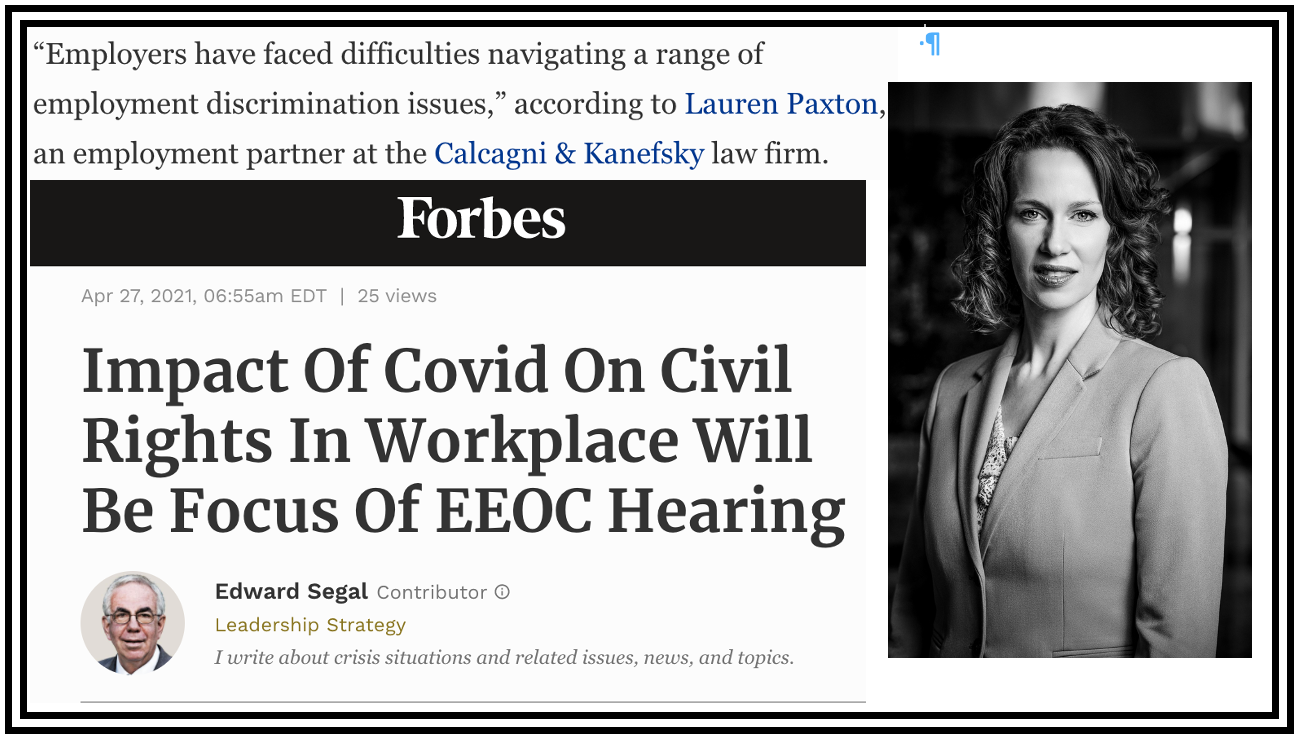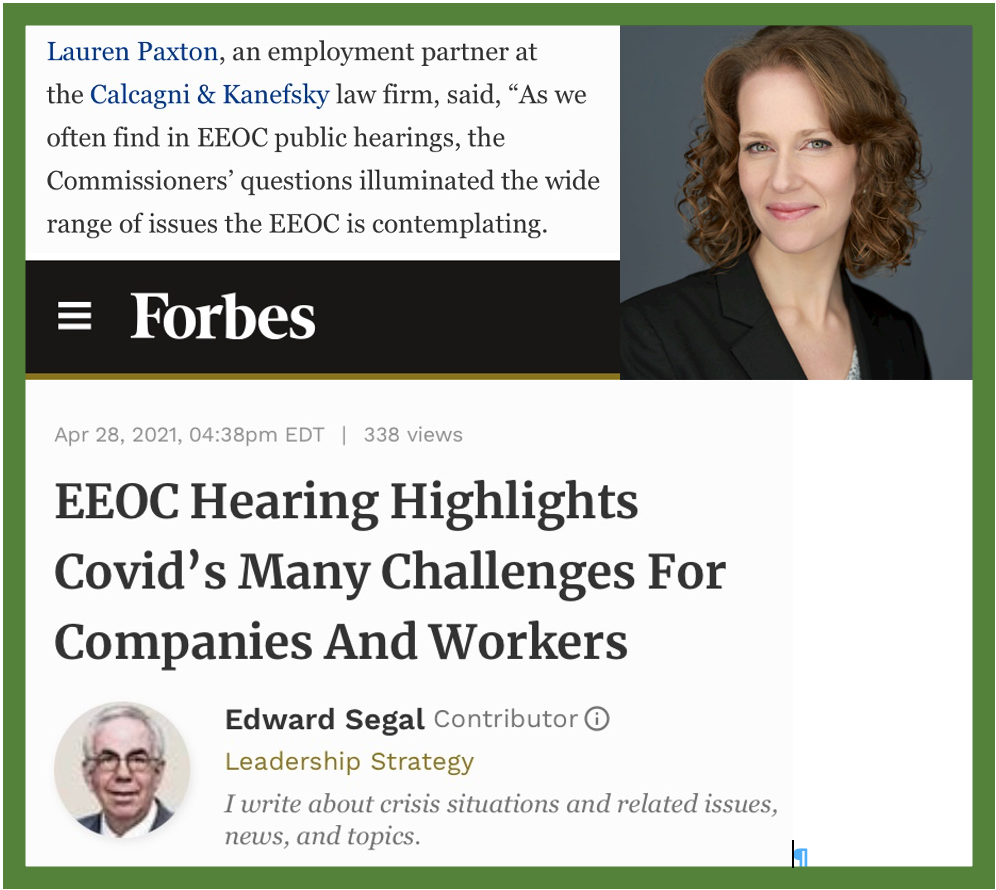Lauren Paxton | Source | Executive Coach & Consultant at Lauren Paxton Consulting & Coaching

Lauren Paxton
Lauren is a Consultant and Coach for Lawyers and Executives. As a former Federal Prosecutor and former Employment Partner at a high ranking law firm, Lauren is intimately aware of the pressures, challenges, and complexities faced by lawyers and other professionals. Lauren’s extensive public speaking experience, CTI coaching training, and TM mindfulness practice enables her to facilitate lasting, purpose-driven change.
As a lawyer, Lauren earned trust at the very top: from being appointed outside investigative counsel to the New York Governor’s Office, and Chair of the Employment Section of the New York County Lawyers’ Association, to being ranked by the prestigious Chambers & Partners, and featured in Forbes and Newsweek. Lauren has become a sought-after speaker on workplace issues within and outside the legal industry. Her track record positions her as a credible guide for ambitious professionals and organizations seeking to evolve with integrity and impact.
As a former federal prosecutor and a former securities enforcement lawyer, Lauren is a seasoned trial attorney with vast experience in federal, state, and regulatory matters, as well as arbitration. She regularly handles employment litigation, workplace investigations, government inquiries, high-stakes workplace disputes, and C-suite employment negotiations.
-
Lauren Paxton Consulting & Coaching (http://www.laurenpaxton.com)
Executive Coach & Consultant
started Apr 2025 -

Calcagni & Kanefsky LLP (http://www.ck-litigation.com/)
Partner
Feb 2020 – Apr 2025
-
Forbes Article: Impact Of Covid On Civil Rights In Workplace Will Be Focus Of EEOC Hearing
Lauren Paxton is quoted on Employment Law issues in the workplace.
Article -
Forbes Article: EEOC Hearing Highlights Covid’s Many Challenges For Companies And Workers
Lauren Paxton is quoted on Employment Law issues discussed during EEOC hearing.
Article -
CFO Magazine Article: CFO Job-Hopping: How Much Is Too Much? - CFO
Lauren Paxton is quoted in CFO magazine on non-competition clauses, non-solicitation clauses, long-term compensation, and other employment law issues implicated by C-suite job transitions.
Article
-
Quoted in Newsweek:
Paxton told Newsweek that, as the worker in the latest Reddit post guessed, "employers may be eligible for federal tax credits under Section 45S of the Internal Revenue Code when providing paid family and medical leave to employees. The tax credit is calculated as a percentage of wages paid to the employee during FMLA leave."
...
Paxton said: "FMLA-covered employers have an obligation to let employees know if they are eligible for FMLA leave, even if the employee did not request FMLA leave in the first place."
...
Paxton said that, once an FMLA-covered employer receives information that the employee could be eligible for such leave, "the employer may be obligated to notify the employee of their eligibility, and designate whether the time off will be considered FMLA leave—all within a matter of days."Therefore, human resources personnel will often try to gather FMLA eligibility information from employees with "a degree of urgency," Paxton said. "There are real consequences for employers that do not timely and properly comply with the federal requirements, including potential liability for monetary losses and equitable remedies."
[Newsweek Article, Employer 'Hounding' Worker for His Baby's Birth Certificate Sparks Debate, BY SOO KIM ON 3/9/23 AT 8:37 AM EST, https://www.newsweek.com/employer-hounding-worker-baby-birth-certificate-1786669]
-
Quoted in Forbes: https://www.forbes.com/sites/edwardsegal/2021/04/27/impact-of-covid-on-civil-rights-in-workplace-will-be-focus-of-eeoc-hearing/
“Employers have faced difficulties navigating a range of employment
discrimination issues,” according to Lauren Paxton, an employment partner
at the Calcagni & Kanefsky law firm.She noted that, “Disability discrimination has been a primary concern
throughout the pandemic. There is no one-size-fits-all approach when it
comes to accommodating workers with disabilities who are particularly
susceptible to Covid-19. Deciding whether to permit certain employees to
remain out of work due to underlying health conditions, and navigating the
labyrinth of state and local leave laws, has been a gauntlet for employers.“These challenges are especially acute for employers in healthcare and other
essential services. Employers in traditional office environments are now
grappling with return- to-work plans that account for employees who refuse
Covid-19 vaccinations (or other safety precautions) for religious or medical
reasons,” she observed.Paxton said the EEOC’s previous guidance “... places a significant burden on
employers that adopt an across-the-board vaccination requirement.
Employers that consider such a requirement must be prepared to justify the
decision by showing how an unvaccinated employee with a disability may be
a ‘direct threat’ to safety in the workplace, and by showing the absence of an
available accommodation, among other things.” -
Quoted in CFO Magazine: https://www.cfo.com/careers/2021/04/cfo-job-hopping-how-much-is-too-much/
Two of the biggest, according to employment practices and litigation attorney Lauren Paxton, are “job trajectory impairment” and long-term compensation loss. Paxton, a partner at Calcagni & Kanfesky LLP, says CFOs often have post-employment restrictive covenants such as non-competition clauses.
“A CFO who hops from one job to another may find their trajectory impaired by periods out of the industry,” she says.
In addition, most CFO compensation packages include short-term and long-term compensation. That longer-term pay, usually restricted stock units and incentive stock options, might take three to five years or longer to vest.
“CFOs will generally forfeit the unvested and restricted portions of their long-term compensation when they resign. As a result, the loss of considerable incentive compensation should be weighed against the increased short-term compensation a new job may offer,” Paxton says.



